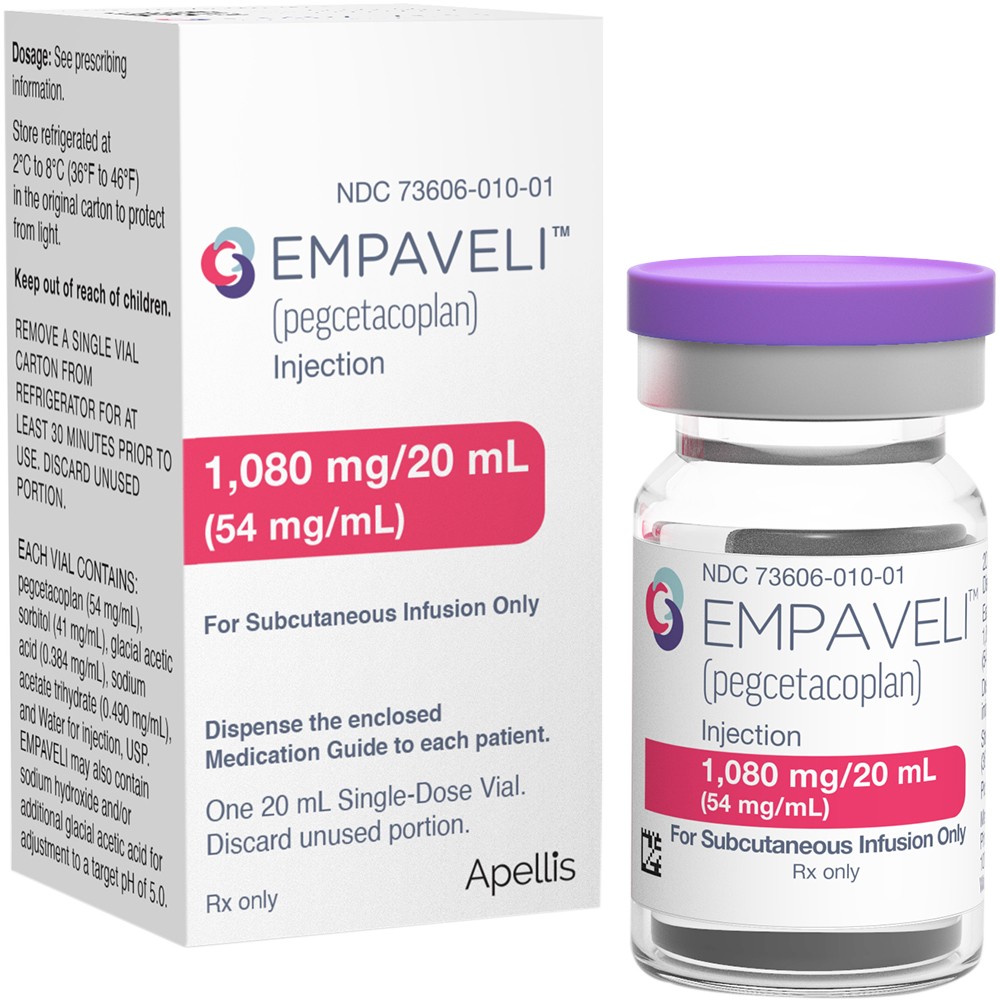
Contents
Empaveli (pegcetacoplan)
Empaveli (pegcetacoplan) is indicated for adults with paroxysmal nocturnal hemoglobinuria (PNH), a rare blood disease.
What are the side effects of Empaveli?
SERIOUS INFECTIONS CAUSED BY ENCAPSULATED BACTERIA
Meningococcal infections may occur in patients treated with Empaveli and may be life-threatening if not recognized and treated early. Use of Empaveli may predispose individuals to serious infections, especially those caused by encapsulated bacteria, such as Streptococcus pneumoniae, Neisseria meningitidis types A, C, W, Y, and B, and Haemophilus influenzae type B.
- Comply with current Advisory Committee on Immunization Practices (ACIP) recommendations for vaccinations against encapsulated bacteria in patients with altered immunocompetence associated with complement deficiencies.
- Vaccinate patients against encapsulated bacteria as recommended at least 2 weeks prior to administering the first dose of Empaveli unless the risks of delaying therapy with Empaveli outweigh the risk of developing a serious infection. See prescribing information for additional guidance on managing the risk of serious infections.
- Vaccination reduces, but does not eliminate, the risk of serious infections. Monitor patients for early signs of serious infections and evaluate immediately if infection is suspected.
Empaveli is available through a restricted program under a Risk Evaluation and Mitigation Strategy (REMS). Under the Empaveli REMS, prescribers must enroll in the program. Enrollment in the Empaveli REMS program and additional information are available by telephone: 1-888-343-7073 or at www.empavelirems.com.
The following significant adverse reactions are discussed in greater detail in other sections of the labeling:
- Serious Infections Caused by Encapsulated Bacteria
- Infusion-Related Reactions
Clinical Trials Experience
Because clinical trials are conducted under varying conditions, adverse reaction rates observed in the clinical trials of a drug cannot be directly compared to rates in the clinical trials of another drug and may not reflect the rates observed in practice.
Paroxysmal Nocturnal Hemoglobinuria
The data described below reflect the exposure of Empaveli in 80 adult patients with PNH who received Empaveli (n=41) or eculizumab (n=39) at the recommended dosing regimens for 16 weeks. Serious adverse events were reported in 7 (17%) patients with PNH receiving Empaveli.
The most common serious adverse reaction in patients treated with Empaveli was infections (5%). The most common adverse reactions (≥10%) with Empaveli were
- injection-site reactions,
- infections,
- diarrhea,
- abdominal pain,
- respiratory tract infection,
- viral infection, and
- fatigue.
Table 1 describes the adverse reactions that occurred in ≥5% of patients treated with Empaveli in Study APL2-302.
Table 1: Adverse Reactions Reported in ≥5% of Patients Treated with Empaveli
| Adverse Reaction | Empaveli (N=41) n (%) |
Eculizumab (N=39) n (%) |
| General disorders and administration site conditions | ||
| Injection-site reaction* | 16 (39) | 2 (5) |
| Fatigue* | 5 (12) | 9 (23) |
| Chest pain* | 3 (7) | 1 (3) |
| Infections and infestations | ||
| Infections* | 12 (29) | 10 (26) |
| Respiratory tract infection* | 6 (15) | 5 (13) |
| Viral Infection* | 5 (12) | 3 (8) |
| Gastrointestinal disorders | ||
| Diarrhea | 9 (22) | 1 (3) |
| Abdominal pain* | 8 (20) | 4 (10) |
| Musculoskeletal disorders | ||
| Back pain* | 3 (7) | 4 (10) |
| Nervous system disorders | ||
| Headache | 3 (7) | 9 (23) |
| Vascular disorders | ||
| Systemic hypertension* | 3 (7) | 1 (3) |
| *The following terms were combined: Abdominal pain includes: abdominal pain upper, abdominal discomfort, abdominal pain, abdominal pain lower, abdominal tenderness, epigastric discomfort Back pain includes: back pain, sciatica Chest pain includes: chest discomfort, non-cardiac chest pain, musculoskeletal chest pain, chest pain Fatigue includes: asthenia, lethargy, fatigue Infections include: oral herpes, bacterial infection, fungal infection, gastrointestinal infection, gastrointestinal viral infection, influenza-like illness, nasopharyngitis, pulpitis dental, rhinitis, tonsillitis, tonsillitis bacterial, vulvovaginal mycotic infection, hordeolum, sepsis, furuncle, otitis externa, viral respiratory tract infection, gastroenteritis, upper respiratory tract infection, bronchitis, ear infection, respiratory tract infection, rhinovirus infection, sinusitis, urinary tract infection Injection-site reaction includes: injection-site erythema, injection-site reaction, injection-site swelling, injection-site induration, injection-site bruising, injection-site pain, injection-site pruritus, vaccination-site reaction, administration-site swelling, injection-site hemorrhage, injection-site edema, injection-site warmth, administration-site pain, application-site pain, injection-site mass, injection-site rash, vaccination-site pain Respiratory tract infection includes: influenza-like illness, nasopharyngitis, rhinitis, tonsillitis, viral upper respiratory tract infection, upper respiratory tract infection, respiratory tract infection, sinusitis Systemic hypertension includes: hypertension Viral infection includes: oral herpes, gastrointestinal viral infection, viral upper respiratory tract infection, rhinovirus infection |
||
Clinically relevant adverse reactions in less than 5% of patients include:
- Intestinal ischemia
- Biliary sepsis
- Hypersensitivity pneumonitis
Description Of Select Adverse Reactions
Injection-Site Reactions
Injection/infusion-site reactions (e.g., erythema, swelling, induration, pruritis, and pain) have been reported during Study APL2-302. These reactions were mild or moderate in severity.
Diarrhea
Nine cases of diarrhea have been reported during Study APL2-302. All cases were mild.
Immunogenicity
As with all therapeutic peptides, there is a potential for immunogenicity. Immunogenicity data are highly dependent on the sensitivity and specificity of the assay. The available methodology and data on anti-pegcetacoplan antibody formation were not adequate to fully assess the incidence of anti-drug antibodies or their effect on pharmacokinetics, pharmacodynamics, safety, or effectiveness of pegcetacoplan.
What is the dosage for Empaveli?
Recommended Vaccination And Prophylaxis
Vaccinate patients against encapsulated bacteria, including Streptococcus pneumoniae, Neisseria meningitidis, and Haemophilus influenzae type B at least 2 weeks prior to initiation of Empaveli therapy according to current ACIP guidelines.
Provide 2 weeks of antibacterial drug prophylaxis to patients if Empaveli must be initiated immediately and vaccines are administered less than 2 weeks before starting therapy with Empaveli.
Healthcare professionals who prescribe Empaveli must enroll in the REMS for Empaveli.
Dosage
The recommended dose of Empaveli is 1,080 mg by subcutaneous infusion twice weekly via a commercially available infusion pump with a reservoir of at least 20 mL.
Dosage For Patients Switching To Empaveli From C5 Inhibitors
To reduce the risk of hemolysis with abrupt treatment discontinuation:
- For patients switching from eculizumab, initiate Empaveli while continuing eculizumab at its current dose. After 4 weeks, discontinue eculizumab before continuing on monotherapy with Empaveli.
- For patients switching from ravulizumab, initiate Empaveli no more than 4 weeks after the last dose of ravulizumab.
Dose Adjustment
- For lactate dehydrogenase (LDH) levels greater than 2 x the upper limit of normal (ULN), adjust the dosing regimen to 1,080 mg every three days.
- In the event of a dose increase, monitor LDH twice weekly for at least 4 weeks.
Missed Dose
Administer Empaveli as soon as possible after a missed dose. Resume the regular dosing schedule following administration of the missed dose.


